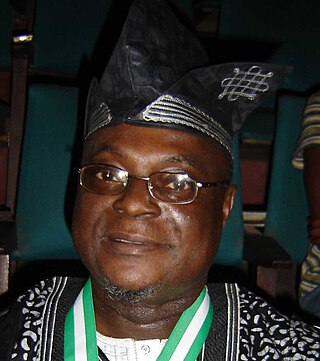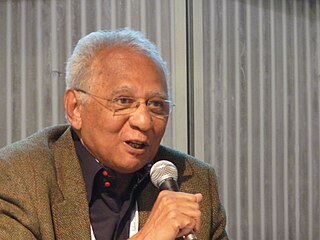Related Research Articles

Akinwande Oluwole Babatunde Soyinka, known as Wole Soyinka, is a Nigerian playwright, novelist, poet, and essayist in the English language. He was awarded the 1986 Nobel Prize in Literature, for "in a wide cultural perspective and with poetic overtones fashioning the drama of existence", the first sub-Saharan African to be honoured in that category. Soyinka was born into a Yoruba family in Abeokuta. In 1954, he attended Government College in Ibadan, and subsequently University College Ibadan and the University of Leeds in England. After studying in Nigeria and the UK, he worked with the Royal Court Theatre in London. He went on to write plays that were produced in both countries, in theatres and on radio. He took an active role in Nigeria's political history and its campaign for independence from British colonial rule. In 1965, he seized the Western Nigeria Broadcasting Service studio and broadcast a demand for the cancellation of the Western Nigeria Regional Elections. In 1967, during the Nigerian Civil War, he was arrested by the federal government of General Yakubu Gowon and put in solitary confinement for two years, for volunteering to be a non-government mediating actor.
In June 1962 a conference of African literature in the English language, the first African Writers Conference, was held at Makerere University College in Kampala, Uganda. Officially called a "Conference of African Writers of English Expression", it was sponsored by the Congress for Cultural Freedom and the Mbari Club in association with the Department of Extra-Mural Studies of Makerere, whose director was Gerald Moore.
The Ga-Dangbe, Gã-Daŋbɛ, Ga-Dangme, or GaDangme are an ethnic group in Ghana, Togo and Benin. The Ga and Dangbe people are grouped respectively as part of the Ga–Dangme ethnolinguistic group. The Ga-Dangmes are one ethnic group that lives primarily in the Greater Accra of Ghana. Ethnic Ga family names (surnames) include Nikoi, Amon, Kotey, Kotie, Adei, Kutorkor, Oblitey, Lartey, Nortey, Aryee, Poku and Lamptey. The following are names derived from the ethnic Dangme and common among the Ningos Nartey, Tetteh, Kwei, Kweinor, Kwetey, Narteh, Narh, Dugbatey, Teye, Martey, Addo, Siaw, Saki, Amanor, Djangba. These are aligned to the ethnic Ga as well: Lomotey, Tetteh, Ankrah, Tetteyfio, Laryea, Ayitey, Okai, Bortey, Quaye, Quaynor, Ashong, Kotei, Sowah, Odoi, Ablor, Adjetey, Dodoo, Darku and Quartey.

Babafemi Adeyemi Osofisan, known as Femi Osofisan or F.O., is a Nigerian writer noted for his critique of societal problems and his use of African traditional performances and surrealism in some of his plays. A frequent theme that his drama explore is the conflict between good and evil. He is a didactic writer whose works seek to correct his decadent society. He has written poetry under the pseudonym Okinba Launko.
Joseph Hanson Kwabena Nketia was a Ghanaian ethnomusicologist and composer. Considered Africa's premier musicologist, during his lifetime, he was called a "living legend" and "easily the most published and best known authority on African music and aesthetics in the world", with more than 200 publications and 80 musical compositions to his credit.

Ghana–Russia relations are the bilateral relationship between the two countries, Ghana and Russia. Russia has an embassy in Accra, and Ghana has an embassy in Moscow. Relations are still very friendly and close.

Henri Lopes is a Congolese writer, diplomat, and political figure. He was Prime Minister of Congo-Brazzaville from 1973 to 1975, and became the Congo-Brazzaville's Ambassador to France in 1998.

Accra Academy is a non-denominational day and boarding boys' school. It is located at Bubuashie near Kaneshie in the Greater Accra Region, Ghana. The school was established as a private secondary educational institution in 1931 and gained the status of a Government-Assisted School in 1950. It was the first private academy to be established in the Gold Coast, and is regarded as one of the foremost secondary educational institutions in Ghana.
Wole Soyinka Prize for Literature in Africa is a pan-African writing prize awarded biennially to the best literary work produced by an African. It was established by the Lumina Foundation in 2005 in honour of Africa's first Nobel Laureate in Literature, Wole Soyinka, who presents the prize, which is chosen by an international jury of literary figures. Administered by the Lumina Foundation, the prize has been described as "the African equivalent of the Nobel Prize".

Beattie Casely-Hayford was a Ghanaian engineer. He was the first director of the Ghana Arts Council, a co-founder of the Ghana National Dance Ensemble, and a director of the Ghana Broadcasting Corporation (GBC).

James Currey is a former academic publisher specialising in African Studies which since 2008 has been an imprint of Boydell & Brewer. It is named after its founder who established the company in 1984. It publishes on a full spectrum of topics—including anthropology, archaeology, history, politics, economics, development studies, gender studies, literature, theatre, film studies, and the humanities and social sciences generally—and its authors include leading names such as Bethwell Ogot and Ngũgĩ wa Thiong'o.
The following is a timeline of the history of the city of Accra, Ghana.
Founders' Day is a national public holiday observed to commemorate the contributions of all the people, notably the "Big Six" who led the struggle for Ghana's independence. The Founder's Day was formerly called "Founder's Day" with the letter "S" appearing after an apostrophe and it was celebrated to earmark the achievements of Osagyefo Dr. Kwame Nkrumah. Kwame Nkrumah was Ghana's first president and a member of the "Big Six". He was born on 21 September, hence, the "Founder's" Day celebration on 21 September in each year in honour of his participation in the Ghanaian movement for independence from British colonial rule. Other members of the "Big Six" were Edward Akufo-Addo, Joseph Boakye Danquah, Emmanuel Obetsebi-Lamptey, William Ofori Atta, and Ebenezer Ako-Adjei. There were several thoughts and realizations of the leaders of the Present President Akufo Addo's regime that other members of the "Big Six" who were part of the struggles for Ghana's independence must be honour as part of the celebration. The name was changed from "Founder's Day" to "Founders' Day". Meaning that the word is plural to include other member of the "Big Six" as part of Ghana's "Founder's Day" celebration and in honour of them.
Atukwei John Okai was a Ghanaian poet, cultural activist and academic. He was Secretary-General of the Pan African Writers' Association, and a president of the Ghana Association of Writers. His early work was published under the name John Okai. With his poems rooted in the oral tradition, he is generally acknowledged to have been the first real performance poet to emerge from Africa, and his work has been called "also politically radical and socially conscious, one of his great concerns being Pan-Africanism". His performances on radio and television worldwide include an acclaimed 1975 appearance at Poetry International at Queen Elizabeth Hall in London, where he shared the stage with US poets Stanley Kunitz and Robert Lowell, and Nicolás Guillén of Cuba.

The history of African Americans in Ghana goes back to individuals such as American civil rights activist and writer W. E. B. Du Bois, who settled in Ghana in the last years of his life and is buried in the capital, Accra. Since then, other African Americans who are descended from slaves imported from areas within the present-day jurisdiction of Ghana and neighboring states have applied for permanent resident status in Ghana. As of 2015, the number of African-American residents has been estimated at around 3,000 people, a large portion of whom live in Accra.
Abena Pokua Adompim Busia is a Ghanaian writer, poet, feminist, lecturer and diplomat. She is a daughter of former Prime Minister of Ghana Kofi Abrefa Busia, and is the sister of actress Akosua Busia. Busia is an associate professor of Literature in English, and of women's and gender studies at Rutgers University. She is Ghana's ambassador to Brazil, appointed in 2017, with accreditation to the other 12 republics of South America.
Stanley Nii Adjiri Blankson is a Ghanaian politician and former mayor of the city of Accra. His mayoral term ended in January 2009 when he was replaced by Alfred Oko Vanderpuije. Since February 2017 he has been a member of Ghana's Council of State.
Ivor Agyeman-Duah is a Ghanaian academic, economist, writer, editor and film director. He has worked in Ghana's diplomatic service and has served as an advisor on development policy.
References
- ↑ Apeakorang, Richard Kwame Twumasi, "Pan African Writers Association Secretariat" (post-graduate thesis, College of Architecture and Planning), KNUST Library, Kumasi.
- ↑ Beatrice Sackey, "The International African Writers Day", Modern Ghana, 6 November 2007.
- 1 2 "Brief History of PAWA", PAWA website.
- 1 2 Femi Akomolafe, "The PAWA of Africa’s literati", New African, 9 December 2014.
- ↑ "The Constitution of the Pan African Writers Association", 1989.
- ↑ "The Declaration", PAWA website.
- ↑ "Professor Atukwei Okai, FRSA, MV" Archived 2015-05-18 at the Wayback Machine , PAWA website.
- ↑ "National iconic poet, Prof Atukwei Okai dies at age 77", GBC, 14 July 2018.
- ↑ Delali Kumapley, "Accra Neighbourhood Watch: Roman Ridge", Lamudi, 25 November 2014.
- ↑ "The Secretariat of PAWA", PAWA website.
- ↑ Evelyn Osagie, "Echoes of Achebe’s works at writers’ show", The Nation (Nigeria), 25 November 2015.
- ↑ "Pan African Writers’ Association Continental Colloquium comes off in Accra", France in Africa, 7 November 2017.
- ↑ Charles Takyi-Boadu, "Nana Weeps For Africa", Daily Guide, 9 November 2017.
- 1 2 3 "Chronicles of PAWA Activities (1989–2013)".
- ↑ "African leaders are guilty for the continent's woes - Wole Soyinka", Modern Ghana, 6 November 2009.
- ↑ "Nobel Laureate Calls For Pan-African Publishers Network", GhanaWeb, 11 November 1997.
- ↑ "Fifth Pan-African Writers Association lectures held in Accra", Modern Ghana, 4 March 2013.
- ↑ Craig Eisele on … "Pan African Writers’ Association Discusses African Unity", 5 December 2007.